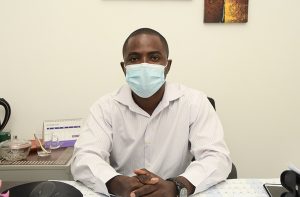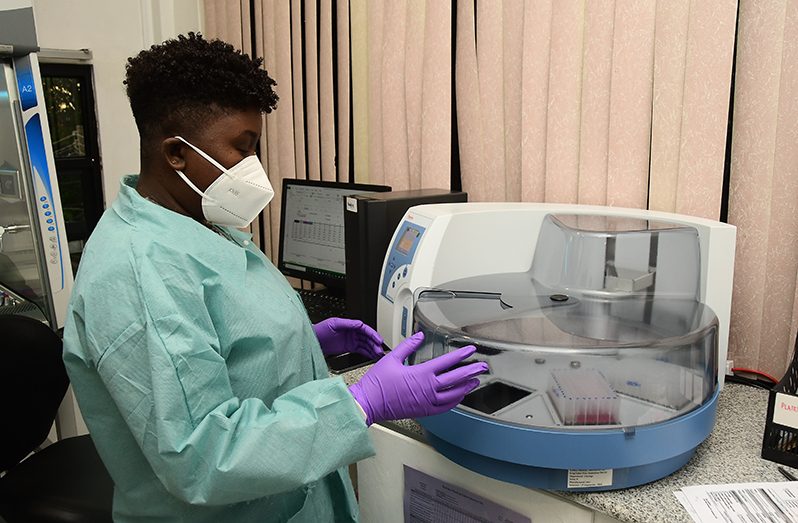IT would appear as though variants of the virus, COVID-19 may have been in Guyana since December 2020, according to tests conducted by the Eureka Medical Laboratories Inc. which detected “abnormalities” in persons who tested positive for COVID-19. Virology Laboratory Manager at Eureka, Paul Cheddie, explained to the Guyana Chronicle that the COVID-19 testing that this private establishment has been offering involves identifying three genes or targets associated with SARS-CoV-2 (the virus that causes COVID-19). These genes, he said, help to enable the COVID variants to bind to human cells and therefore, enter and infect the cells. The manager, however, highlighted that the variants can be identified because they have one less gene (that is, they have only two genes).

“When we see a positive of two genes versus a positive of three genes, that’s how we’re able to presumptively know that maybe we’re looking at something that is a variation of what we’ve previously been identifying,” Cheddi said. Three newer variants of COVID-19 have been under the spotlight. One more transmissible variant was found after genomic sequencing was done in the United Kingdom, another variant was discovered in South Africa and a third was more recently discovered in Nigeria. Reports so far indicate that persons present with the same symptoms of COVID-19 and that there is no increased chance of mortality. What this means is that when the sample collected from an individual tests positive for COVID-19 but it is also observed that the third gene is missing, it is likely that this person has been infected with a variant (or different strain) of COVID-19.
Cheddie further disclosed that a number of these “abnormalities” were discovered in December, and it was usually recorded from persons who recently travelled outside of Guyana. There have been no new potential cases of the COVID-19 variants recorded for the New Year, thus far, at the Eureka lab. For the ‘UK variant’, reports indicate that the missing gene – the S gene – has indeed ‘dropped out’. The Guardian in the UK reported that it is not unusual to see some S gene dropouts in a small number of positive samples. If a larger amount of samples (relative to the population) shows the S gene dropout, then, there would be a much greater cause for concern. The emergence of this specific variant prompted several countries to prohibit all flights from the UK and other countries that documented cases with the variant. The Caribbean Public Health Agency (CARPHA) emphasised that the Caribbean region has a “very high” risk of importing this ‘UK variant’ and indicated that four cases were already confirmed in Jamaica.
‘DIFFICULTY PINPOINTING’
Though Eureka is able to determine that the virus someone has been infected with is likely a variant of COVID-19, they are unable to definitively state which variant it is. Nowhere in Guyana’s health system — public or private — has the ability to identify the variant, currently. “Any further identification or characterisation of the variant would require us to do genomic sequencing which we are not able to do at this time, mainly because of resource constraints,” Cheddie said, adding that the Centre for Disease Control and Prevention (CDC) or the World Health Organisation (WHO) can provide assistance in this regard. Cheddie further disclosed that a number of these “abnormalities” were discovered in December, and it was usually recorded from persons who recently travelled outside of Guyana. There have been no new potential cases of the COVID-19 variants recorded for the New Year, thus far, at the Eureka lab.
Eureka Labs have also begun reducing the number of tests that utilise the technology to test for the three genes (and thus, allowing for the discovery of potential variants) due to the limited quantity on the global market. Instead, they have been increasingly using a ‘two-gene’ testing regime, which still allows for the entity to determine whether someone has been infected with COVID-19, but it does not allow for the determination of whether it is a variant or not. The Eureka manager also disclosed that current health guidelines from the Ministry of Health do not mandate that private facilities which are testing for COVID-19 to inform them of these potential cases of the variants. All that is currently required is the personal information of individuals who have tested positive so that isolation and contact tracing can be done.
CONCERN FOR CHILDREN
The COVID-19 virus is known to have a disproportionate and severe impact on elderly folks, and more so those with comorbidities. Global reports on the UK variant indicate, however, that it may be able to affect children more than the ‘normal’ COVID-19 virus. As such, Cheddie posited that the potential of this variant to have an impact on children is one which Guyana should be wary of. He emphasised that as the discussions on the reopening of schools intensify, there should be greater consideration on protecting the children returning to schools. He also emphasised that it would appear as though more persons are now interested in travelling abroad since the number of individuals requesting polymerase chain reaction (PCR) from Eureka has been on the increase. He advised against travel at this time. Eureka offers private testing for COVID-19 and on average, tests 150 to 200 persons per day.
Amidst growing concerns of the impact this new strain will have on the Caribbean, a report from CARPHA stated: “… countries are urged to continue maintaining national regulations inclusive of limiting gatherings, observing physical distancing measures, as well as appropriate hand hygiene and use of facial coverings where applicable. Country travel guidelines and entry requirements should continue to be enforced.” On Wednesday, a representative of the Health Ministry told this newspaper that the ministry has not yet made the decision to impose any additional restrictions at this time but affirmed that engagement with CARPHA is ongoing.




.png)









